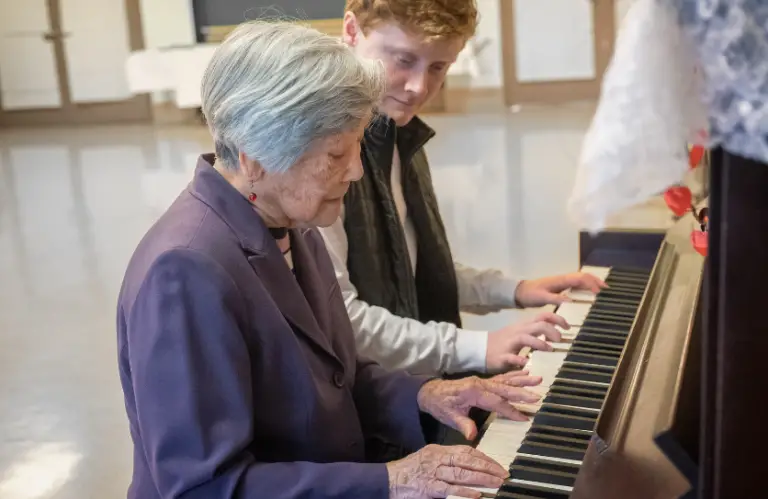Playing the piano is a wonderful hobby that provides a wealth of benefits, especially for seniors. It’s a perfect activity for those who are looking for a new challenge or want to improve their physical and mental well-being. The benefits of playing piano for seniors are numerous and include:
Table of Contents
Improving Cognitive Function:
- Regularly playing the piano has been shown to improve cognitive function in seniors by requiring the use of multiple parts of the brain at the same time, including memory, motor skills, and spatial reasoning. These mental exercises help to keep the brain sharp and can even slow down the progression of age-related cognitive decline.
Improving Physical Health:
- Piano playing improves hand-eye coordination and dexterity, as well as helps to keep the fingers, hands, and arms agile. Additionally, playing the piano requires the use of both hands, which helps to improve balance and stability. This is especially important for seniors, as maintaining good physical health is essential for independence and overall well-being.
Providing a Sense of Purpose:
- Playing the piano can provide a sense of purpose and fulfillment. It can give seniors a new hobby to focus on and a sense of accomplishment as they improve their skills. Additionally, playing piano can help seniors to feel more connected to their community, as they may attend concerts or join a local choir. This can be especially important for those who have lost a loved one or are experiencing loneliness due to social isolation.
Fostering Creativity:
Playing the piano allows seniors to tap into their imaginative side. Whether you’re composing your own music or playing along to your favorite songs, playing piano provides a welcome escape from technology and allows seniors to express themselves in a new and creative way.
Some additional tips for seniors looking to take up the piano:
Start Slow: If you’re new to piano playing, start slow. Begin by practicing simple songs and work your way up to more complex pieces.
Take Lessons: Consider taking lessons from a qualified instructor. This will ensure that you’re playing correctly and help you to avoid any potential injury.
Practice Regularly: The more you practice, the better you’ll get. Try to practice for at least 30 minutes a day, or as often as you can.
Have Fun: Remember, playing the piano is meant to be enjoyable! Don’t get too caught up in perfecting your skills, have fun and enjoy the journey.
In conclusion, playing the piano is a fantastic activity for seniors that offers a range of benefits, both physical and mental. Whether you’re a seasoned musician or just starting out, playing piano is a great way to keep your mind and body active and to stay connected to your community. If you’re looking to learn a new skill, or just want to add a little excitement to your retirement years, consider taking up the piano. And if you’re already a pianist, why not revisit your passion and see how much you can improve?
As a reminder of the previous article “What Should I Learn First on Piano“, it’s important to remember that playing the piano can offer numerous benefits, and it’s never too late to start. So, don’t wait, start exploring the world of piano today! Whether you’re looking to improve your cognitive function, physical health, or just want to have a little fun, playing the piano is a fantastic choice. So, get out your sheet music and start playing today!

